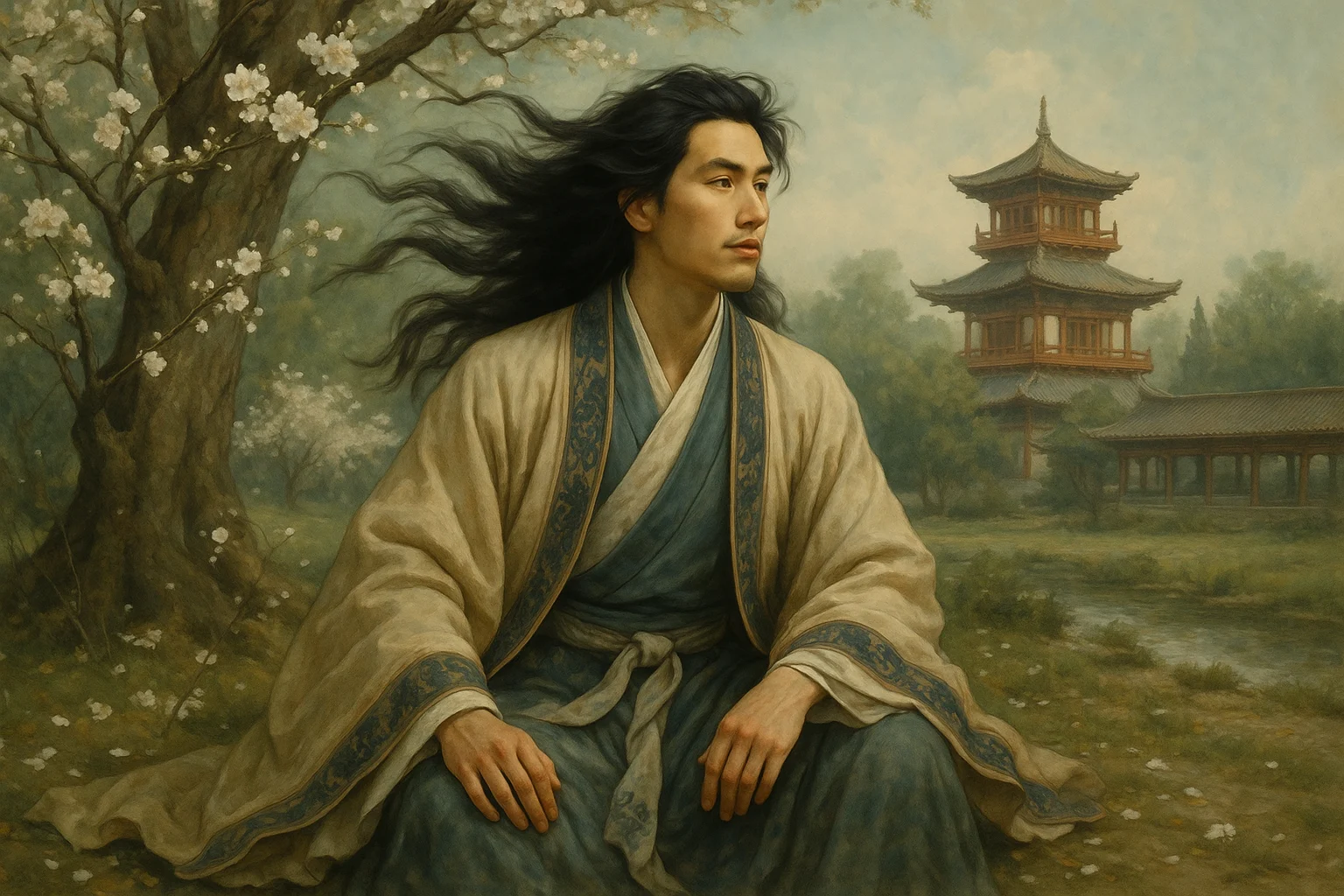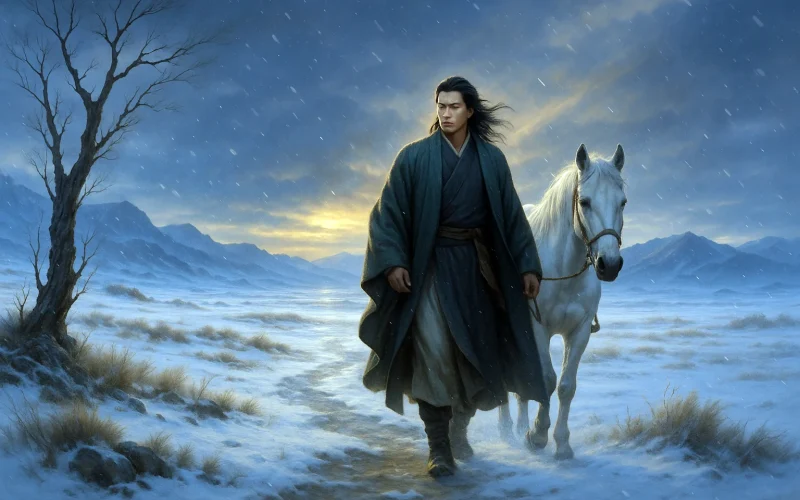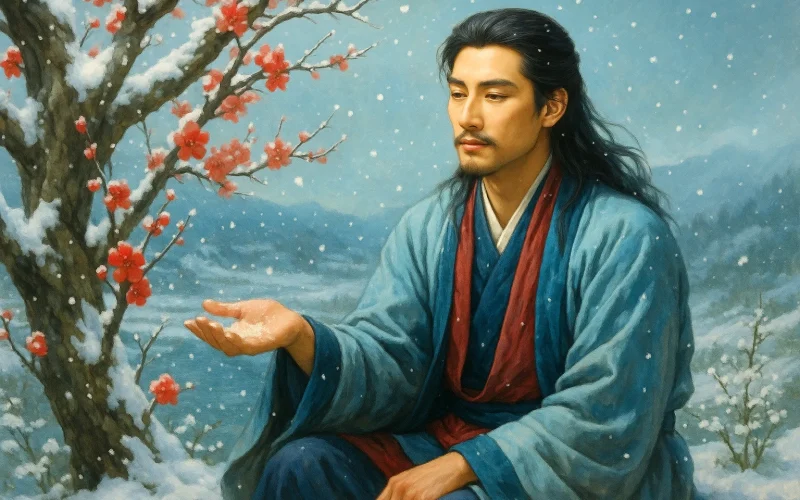Neighbors knew not this rooster-fighting sage,
Yet closed doors showed a hermit's noble rage.
Once wandering by miniature hills he played,
Now famed for serving where Great River strayed.
Alone he rides through frozen wastes afar,
In thick-furred robes 'mid winter's harshest star.
Silent, his homeland soon will reappear -
Luo City's east, where twilight snows adhere.
Original Poem
「送王府张参军附学及第东归」
韩翃
邻家不识斗鸡翁,闭户能齐隐者风。
顾步曾为小山客,成名因事大江公。
一身千里寒芜上,单马重裘腊月中。
寂寂故园行见在,暮天残雪洛城东。
Interpretation
This poem was composed during the mid-to-late Tang Dynasty, a period when the once-prosperous Tang Empire was transitioning into decline, marked by social upheavals and frequent political strife. The subject of the poem, Military Consultant Zhang, was a scholar who had successfully ascended the official ranks through the imperial examination system. Written at the moment when Zhang, having passed the exams with honors, was about to return east to his hometown, the poem expresses the poet's joy for his friend's official success. Simultaneously, through its depiction of the hardships of travel and the desolate scenes of homecoming, it reflects the very human experiences of warmth and coldness that exist beyond the realm of officialdom.
First Couplet: "邻家不识斗鸡翁,闭户能齐隐者风。"
Lín jiā bù shí dòu jī wēng, bì hù néng qí yǐn zhě fēng.
Neighbors know not the old man of cockfights,
Yet shut indoors, he rivals a hermit’s grace.
The couplet opens with paradoxical imagery, contrasting the vulgar "cockfight" allusion with the refined "hermit’s grace." The "shut doors" symbolize deliberate isolation, while "rivals" (齐) elevates the subject’s unworldly dignity beyond mere reclusion. This juxtaposition critiques societal blindness to true nobility, framing the protagonist as a hidden sage.
Second Couplet: "顾步曾为小山客,成名因事大江公。"
Gù bù céng wéi xiǎo shān kè, chéng míng yīn shì dà jiāng gōng.
Once, pacing hills, I was a recluse at ease;
Now famed for serving the Lord of Great River.
Here, temporal duality unfolds: "pacing hills" (顾步) evokes a past of leisurely solitude, while "famed for serving" marks a politicized present. The "Lord of Great River" (大江公) symbolizes worldly power, rendering the shift from hermitage to bureaucracy a tension between ideals and compromise. The couplet’s parallel structure underscores this life-altering pivot.
Third Couplet: "一身千里寒芜上,单马重裘腊月中。"
Yī shēn qiān lǐ hán wú shàng, dān mǎ chóng qiú là yuè zhōng.
Alone for miles on frost-scorched wastes,
One horse, thick furs, midwinter’s depth.
The imagery turns starkly physical: "frost-scorched wastes" (寒芜) and "thick furs" (重裘) amplify the journey’s brutality. "Alone for miles" (一身千里) and "midwinter" (腊月) fuse spatial and temporal desolation, while the single horse—a minimalist detail—epitomizes resilience. The couplet’s austerity mirrors the protagonist’s unspoken endurance.
Fourth Couplet: "寂寂故园行见在,暮天残雪洛城东。"
Jì jì gù yuán xíng jiàn zài, mù tiān cán xuě luò chéng dōng.
Silent, my old home emerges ahead—
Twilight’s last snow east of Luoyang.
The finale merges memory and reality: "silent" (寂寂) and "last snow" (残雪) suffuse the return with elegiac stillness. "East of Luoyang" (洛城东) anchors the scene geographically, yet "twilight" (暮天) casts it in transience. The "emerging" (行见) home is less a destination than a spectral relic, blending solace and sorrow in the poem’s closing breath.
Holistic Appreciation
This poem delicately portrays the protagonist's official career and nostalgic longing for home. The opening couplet, through its depiction of neighborhood attitudes and the demeanor of a recluse, expresses admiration for the friend's character. The middle couplets reflect on the past, highlighting personal growth and social standing. The concluding couplet captures the solitude of the journey and the tranquility of homecoming, using imagery of lingering snow and twilight skies to create a poignant yet restrained atmosphere. With sincere yet understated emotion, concise language, and profound意境, the poem exemplifies Han Hong's characteristically subtle and profound poetic style.
Artistic Merits
Composed in the seven-character regulated verse form, the poem demonstrates rigorous structure with perfectly balanced parallel couplets. Its unadorned yet vivid language creates strong visual imagery that reveals character and setting. The poet masterfully employs austere imagery to convey emotion, resulting in a solemn and far-reaching atmosphere throughout the work.
Insights
This poem reminds us to maintain inner composure and resilience amidst the vicissitudes of official life and personal journey. It shows how one can preserve authenticity while facing solitude and hardship. The complex emotions of homesickness and life's transience, common to all travelers, are rendered here with restrained yet profound strokes. The work ultimately suggests that true nobility lies in quiet endurance and the ability to find peace in homecoming, whether literal or spiritual.
About the Poet

Han Hong(韩翃), a native of Nanyang, Henan, was one of the "Ten Literary Masters of the Dali era" (大历十才子). He was renowned for his poetry, particularly farewell and parting verses, which gained significant acclaim during his time. The Complete Tang Poems (《全唐诗》) preserves three volumes of his works.












